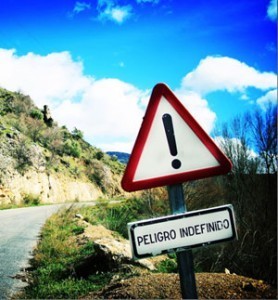Rolf Potts's Blog, page 102
March 23, 2012
Inside the Secret World of Language-Learning Superstars
Vagablogging :: Rolf Potts Vagabonding Blog

Speaking in tongues. Photo: Taylor Sloan / Flickr
In how many languages do you know how to say "hello"? If you can answer, "11 or more," you qualify as a hyperpolyglot, according to this article in The Economist: Foreign Languages: The Gift of Tongues.
The article starts with a historical figure, Cardinal Mezzofanti of Bologna, Italy. He was famed as a master of languages. Native speakers from points far and wide would come to test his fluency, reportedly coming away stunned at the count's way with words. No one knew for sure how many tongues he could speak in, but it was obviously far greater than the norm.
A piece in The New York Times shined a spotlight on a rising star in the scene: A Teenage Master of Languages Finds Online Fellowship. Timothy Doner is a 16-year-old from New York who claims to speak over a dozen languages. The article contains a video with Doner showing off his multilingual chops.
YouTube is a hotspot for these types, as it gives them the chance to record themselves and hopefully get feedback from native speakers. Another active community is How to Learn Any Language. It's fun to check out their profiles of various languages, ranging all the way from Arabic to Turkish. There are comments on "usefulness," "chic factor," and "travel." All to help aspiring polyglots choose the next one to master.
Getting back to Cardinal Mezzofanti, many speculated about how he pulled off such feats. Was it talent or hard work, or a mix of both? There was one clue discovered after he died:
At the end of his story, however, he finds a surprise in Mezzofanti's archive: flashcards. Stacks of them, in Georgian, Hungarian, Arabic, Algonquin and nine other tongues. The world's most celebrated hyperpolyglot relied on the same tools given to first-year language-learners today.
Talent certainly helps, but there's no substitute for good old-fashioned practice. Even geniuses need to brush up to maintain their skills.
How many languages have you learned? What tips and tricks helped you progress? What's your favorite language? Please share your experiences in the comments.
Original article can be found here: Inside the Secret World of Language-Learning Superstars
March 22, 2012
Vagabonding as a rock musician: a step by step guide. Post #1: how to get started
Vagablogging :: Rolf Potts Vagabonding Blog
 This article is the first in a series of posts explaining how to bring your music on the road and get to travel with it (Read the series' introduction)
This article is the first in a series of posts explaining how to bring your music on the road and get to travel with it (Read the series' introduction)
To be able to travel with your music, and I mean being able to get paid – even a tiny bit – to play, one of the basic requirements is to have some good music to "sell". It needs to be original, your own. Too many artists around the world fail to overcome their insecurity, consequently failing to create original music. However, you should also consider the reality: it is highly improbable that a promoter would book a cover band for an European tour.
Therefore, the first thing you have to consider is yourself: what does your band have that others have not? Sometimes it is just matter of finding a shade of color in a genre, in any niche, to be able to get incredible results. It is really impossible to suggest some general lines about what a band should do to be better, as there would be a million different answers. The best lies always within yourself and your current capabilities. Once you know what you want to play, you have a definite lyrical idea, a concept, and you have some songs, half of the job is done. The other half is keeping at honing your craft and play live shows.
In fact, the biggest mistake many musicians commit is thinking that they have to wait before they can perform in front of a public. This ideas leads, most of the times, to the band's break up after a very few shows, and does not add much to the experience of a musician. I personally found that playing as many shows as possible was the best way to improve my self esteem, write better music, and become a better performer. Nowadays, as there is an infinite number of independent bands out there, it is also true that such an infinity does not generally stand out. You have to find the positive aspect/s in your group, and make it/them show.
Again, playing live shows is the key: because you will get to travel ONLY if you become an experienced touring band. Of course, at the beginning, every band has to pay its dues and bite the dust… it's all part of the game. After a few months, or years, you will find out that the number of contacts you gathered this way will be well worth the effort. I had to work hard myself for 5 years, playing countless shows in Europe, before I could embark on an American tour organized by a respectable local promoter. We toured 13 states for three weeks, played around 20 shows in 20 different cities, and managed to pay all expenses (including an international flight) with a total loss of around 800 US $ to be split among four. Not that bad, isn't it?
In a nutshell, in order to get started, you need to focus on your own peculiarity as a band – sound, appearance, and lyrical content – and start to create original music. The second step will be playing local shows. A great tip for this is to "exchange" shows with bands you know from different cities: play host first organizing a gig, then you will be their guest. If you could talk a club promoter into giving you some space to book shows, you would be a few steps ahead of everyone else already. Making contacts to play shows is also another key aspect of your successful start up.
Has anyone tried to establish as an independent musician before? How do you think playing many shows can build up your touring career? I would not be surprised to receive totally antithetic comments, as such is the nature of the music business.
Original article can be found here: Vagabonding as a rock musician: a step by step guide. Post #1: how to get started
Will you ever stop travelling?
Vagablogging :: Rolf Potts Vagabonding Blog

google images clip-art
A friend asked me, "Will you ever stop travelling?" and without hesitation I answered, "No." Then he looked at me earnestly for an explanation.
Truth is, a few years ago I gave his question a lot of thought. I'd been perpetually moving for three years and decided to rent a 21 acre farm, unpack boxes and take a romantic relationship to the next level. But then I tacked up a world map on the wall and imagined all the places I wanted to go. Kahili Gibran wrote, "Your soul is oftentimes a battlefield, upon which your reason and your judgment wage war against your passion and your appetite." My passion craves movement.
When my friend, Steve, was younger, like many of us, he moved around a lot. He played music, took photographs, and rode track horses as a jockey. Then ten years ago he bought a huge hand-built cabin on a creek, took in a bunch of rescue animals and hasn't gone very far since. Now he feels stuck. Our conversation reminded me how important it is to make conscience decisions as we move through life.
While living at that farm I discovered the book Vagabonding and only pulled it off the shelf for a closer look because I had no idea what the word meant. Before dawn broke the next day; I'd read it cover to cover. In the last few pages Rolf Potts points out, "If travel truly is in the journey and not the destination, if travel really is an attitude of awareness and openness to new things, then any movement can be considered travel." But he goes on to say, "…it's important to remember that your vagabonding attitude is not something you can turn on and off when it's convenient." So as that map seemed to emanate from the wall and take on a pulse of its own; I decided to follow my passion and appetite for movement and keep travelling.
Original article can be found here: Will you ever stop travelling?
March 21, 2012
Vagabonding Case Study: Jasmine Stephenson
Vagablogging :: Rolf Potts Vagabonding Blog
Jasmine Stephenson
Age: 26
Hometown: Tampa, Florida
Quote: "Stop making excuses. You will find a million reasons not to go, a million things holding you back. It's okay to be afraid, nervous, anxious, doubtful. It will all be worth it. Take the leap."
How did you find out about Vagabonding, and how did you find it useful before and during the trip?
It's one of those must-read travel/inspiration books, especially for people with nomadic aspirations. How could a traveler, especially a digital nomad, not hear about it?
How long were you on the road?
I've been traveling for roughly four years and am still on the road.
Where all did you go?
I've lived in Australia and New Zealand, traveled through Southeast Asia and Italy, and have been in Latin America for the past couple of years (mostly Colombia.)
What was your job or source of travel funding for this journey?
In Australia and NZ, I did working holidays. Now, I write, do internet marketing, and own a couple of websites that earn me money.
Did you work or volunteer on the road?
I worked in NZ and Australia bartending and doing office temp jobs.
Of all the places you visited, which was your favorite?
Colombia is my favorite country by far. I love everything about it – the people, the landscape, the culture, the food. It's the only country I've been where I feel like these are my people, and this could be my home. I fit there.
Was there a place that was your least favorite, or most disappointing, or most challenging?
I went to Honduras about a year after the Zelaya coup. I felt it was a really hostile place, and the capital, Tegucigalpa, was the most dangerous city I've ever been to. The owner of the hotel I stayed at told me to leave everything in the room, including money, because people there would kill me for a cell phone (his words, not mine). Also, some drunk guy tried to grab my vagina in the central park. Luckily, I was able to push him away before anything happened.
Did any of your pre-trip worries or concerns come true? Did you run into any problems or obstacles that you hadn't anticipated?
I've been traveling for a while, so I don't really have any worries about the travel process. Renewing visas is always a little anxiety-ridden but it works out in the end.
Which travel gear proved most useful? Least useful?
Money belts suck. Sarongs are awesome.
What are the rewards of the vagabonding lifestyle?
Wow there are so many. The endless opportunities for learning is the biggest reward for me. Then there's the cool people you meet, the places you see, the new experiences. I love it.
What are the challenges and sacrifices of the vagabonding lifestyle?
You sacrifice being a part of people's day-to-day lives. Your friends and family will start getting married and having babies, and you won't be there. Other times, the relationships with friends that you make on the road can't really progress because there are no shared experiences after you leave a certain place. And romantic relationships are extra challenging.
What lessons did you learn on the road?
I've learned tons. Be patient. Relax. Don't take yourself too seriously. Open your mind and heart to new cultures and customs. The most important is that people are generally good and will help you if you're in need.
How did your personal definition of "vagabonding" develop over the course of the trip?
I think in the beginning, my notions of vagabonding were more romantic… like every day would be filled with adventure and I would be doing amazing things all the time. Now, vagabonding for me is a lifestyle choice with its benefits and drawbacks just like any other way of life.
If there was one thing you could have told yourself before the trip, what would it be?
I would have told myself to try to adapt to the local culture ASAP and not be so stuck in my old ways. I learned the lesson eventually, it just took some time.
Any advice or tips for someone hoping to embark on a similar adventure?
Stop making excuses. You will find a million reasons not to go, a million things holding you back. It's okay to be afraid, nervous, anxious, doubtful. Emotions are temporary. When your plane is landing in that foreign and exotic destination, when you meet your first friend, when you first lay eyes on that amazing work of nature… it will all be worth it. Take the leap.
When and where do you think you'll take your next long-term journey?
I'm still on it. I think travel will always be an integral part of my life. I'll at least end up an expat somewhere cool.
Website: jasminewanders.com
Twitter: jasminewanders
Are you a Vagabonding reader planning, in the middle of, or returning from a journey? Would you like your travel blog or website to be featured on Vagabonding Case Studies? If so, drop us a line at casestudies@vagabonding.net and tell us a little about yourself.
Original article can be found here: Vagabonding Case Study: Jasmine Stephenson
Thin places: The reasons we travel
Vagablogging :: Rolf Potts Vagabonding Blog
Sometimes, it's hard to explain why we travel. Us travelers like to view ourselves as different than tourists, and our journeys as different than vacations. We enjoy experiences, people and perhaps most importantly those unpredictable things that come from freely roaming. There's a feeling that comes with these experiences that can simply be hard to describe.
I think this recent New York Times article, Thin Places, Where Heaven and Earth Come Closer, comes close. It speaks of those special places that evoke that feeling where the world seems to stand still and we feel we are exactly where we need to be.
As the writer says, "I'm drawn to places that beguile and inspire, sedate and stir, places where, for a few blissful moments I loosen my death grip on life, and can breathe again. It turns out these destinations have a name: thin places."
It's an odd term apparently derived from a Celtic saying referring to the thin space between heaven and earth that exists in these special places, according to the article, but that doesn't mean these places need to be sacred or well-known.
"The question, of course, is which places? And how do we get there? You don't plan a trip to a thin place; you stumble upon one. But there are steps you can take to increase the odds of an encounter with thinness. For starters, have no expectations. Nothing gets in the way of a genuine experience more than expectations, which explains why so many 'spiritual journeys' disappoint. And don't count on guidebooks — or even friends — to pinpoint your thin places. To some extent, thinness, like beauty, is in the eye of the beholder. Or, to put it another way: One person's thin place is another's thick one."
I have only been traveling for a month but I believe I've already experienced one "thin place" of my own. Thousands of tourists visit this place and possibly view it as "just another set of church ruins," which is perfectly fine. But for me, it was otherworldly. It was peaceful. It was absolutely the reason that I travel.
I completely agree that these types of experiences can only happen when we are free of expectations and of the "tourist" mindset. We don't travel just to see places that everyone else says are great. In fact, it's not really about seeing places at all.
"Thin places relax us, yes, but they also transform us — or, more accurately, unmask us. In thin places, we become our more essential selves."
Travelers, have you experienced a "thin place?" Please share!
Original article can be found here: Thin places: The reasons we travel
March 20, 2012
Regrets of the dying, lessons for the living
Vagablogging :: Rolf Potts Vagabonding Blog
Photo from Montgomery Martin
It's possible that some of you have seen this viral study by Australian palliative nurse Bonnie Ware. In this article, which has since become a book, she records the most common regrets of her patients in their last weeks of life. She witnesses end-of-life epiphanies and received overwhelmingly consistent responses when she asked about regret. Similar themes continued to surface as her patients faced mortality, and it's evident that the responses were too striking not to share.I'm assuming most Vagablogging readers are not in their final weeks, but I am certain that the lessons here are central to the vagabond psyche and will inspire anyone who gives the article a read. The regrets can relate especially to long term travel, whether it's a two month break in career or a permanent lifestyle redesign, and the anxieties experienced by those who may second guess a big decision. They echo the ideologies expressed in Vagabonding – that taking a "deliberate, time-honored walk through life" is much more rewarding than living as others see fit. It seems that in life's final moments, we will have more regret about not doing something than about taking a potentially life altering risk in the pursuit of happiness.
Ware's findings, like much of the content and lessons in Vagabonding, act as a reminder that this life is short. It reminds us to focus less on the rat race and more on making meaningful use of our time, living not as others expect us to live but as we choose to live. "Vagabonding is not a lifestyle, nor is it a trend. It's just an uncommon way of looking at life – a value adjustment from which action naturally follows. And, as much as anything, vagabonding is about time – our only real commodity – and how we choose to use it." I think about Vagabonding and these five regrets of the dying and remind myself that a gap in my resume for long term travel is much more rewarding than a year behind my desk.
Is our society too focused on the pursuit of achievement instead of the pursuit of happiness? Do we suppress our emotions and work too hard in search of career progression, and too often sacrifice family, friends and time? If these dreams of living as others see fit don't materialize, will we be left with the 5 regrets of the dying?
Considering a big risk? Take the leap! We learn here that it's better to have risked and lost than never to have risked at all.
Original article can be found here: Regrets of the dying, lessons for the living
Whose life are you living?
Vagablogging :: Rolf Potts Vagabonding Blog
 Carpe diem. Seize the day. Make the most of today. Don't worry about the future.
Carpe diem. Seize the day. Make the most of today. Don't worry about the future.
We've all heard it. We've all heard the urgings of others pushing us toward our dreams. "Live for today," they say. "Let tomorrow take care of itself."
But should we?
Society has raised us for something different. We've been taught since childhood to suffer through today in order to have a better tomorrow. We've been raised to toe the line and not question the traditional path through life.
Yet what if we want something different? What if the traditional version of the American Dream with the white picket fence and two SUVs in the driveway doesn't cut it for us?
Then make your own way through life. Throw caution to the wind and define your own American Dream. It's your life and you get to call the shots.
And all those people out there who say you can't? Are you really going to give them a vote?
Yes, it's scary to buck the status quo, but we know someone who's time on planet Earth has ended all too soon. All we're assured of having is right here, right now. Tomorrow may never come.
Don't be afraid to chase your dreams – wherever they may lead.
Original article can be found here: Whose life are you living?
Who's life are you living?
Vagablogging :: Rolf Potts Vagabonding Blog
 Carpe diem. Seize the day. Make the most of today. Don't worry about the future.
Carpe diem. Seize the day. Make the most of today. Don't worry about the future.
We've all heard it. We've all heard the urgings of others pushing us toward our dreams. "Live for today," they say. "Let tomorrow take care of itself."
But should we?
Society has raised us for something different. We've been taught since childhood to suffer through today in order to have a better tomorrow. We've been raised to toe the line and not question the traditional path through life.
Yet what if we want something different? What if the traditional version of the American Dream with the white picket fence and two SUVs in the driveway doesn't cut it for us?
Then make your own way through life. Throw caution to the wind and define your own American Dream. It's your life and you get to call the shots.
And all those people out there who say you can't? Are you really going to give them a vote?
Yes, it's scary to buck the status quo, but we know someone who's time on planet Earth has ended all too soon. All we're assured of having is right here, right now. Tomorrow may never come.
Don't be afraid to chase your dreams – wherever they may lead.
Original article can be found here: Who's life are you living?
March 19, 2012
Guidebook field review: Moon San Miguel de Allende, Guanajuato and the Bajio
Vagablogging :: Rolf Potts Vagabonding Blog
Occasional vagablogging contributor Kristin Van Tassel sends us this guidebook review from Mexico:
Last October Moon published the travel handbook Moon San Miguel de Allende, Guanajuato and the Bajio
, written by Julie Doherty Meade. In February I traveled to Central Mexico for the first time, and Meade's book was of great help to me.
What I most appreciated about the handbook was its substantive section on the city of Guanajuato, a city I had not heard of prior to reading the book. I'd journeyed to Mexico to attend a writing conference in San Miguel de Allende. But Meade's book persuaded me to visit Guanajuato as well, and I liked it so much that if I were to go to Central Mexico again, which I hope to do, I would focus my visit on that city. Meade describes Guanajuato as "almost mythical in its beauty," as though "plucked from a fairy tale," and this is no exaggeration. But also, the concrete, practical nature of Meade's book directed me to a number of great places and resources. For example, the city has a wonderful museum dedicated to artistic representations of Cervantes' Don Quixote (Museo Iconográfico del Quijote). I stayed at Casa Mexicana, a hotel close to the city center which is also affiliated with an intensive Spanish language school, Escuela Mexicana. The hotel was bright, cheerful, and reasonably priced, as Meade promised, and the staff members were warm and helpful, which was reassuring during my first few days in the country. I enjoyed my 90-minute visit at the language school so much that I hope to return with my children as well as a group of college students. Furthermore, Meade's description of the city's geography was useful in navigating its winding, potentially disorienting streets.
I also used Meade's recommendations to choose accommodations in San Miguel de Allende. After checking out several options once I was in the city, all of them described in Meade's book, I settled on Parador San Sebastián de Aparicio. It was a lovely place to stay – my room was back away from the street and very quiet, and there was a gorgeous courtyard at the entrance – for only a little over $30 a night. I also followed Meade's guidebook in order to find walking tours of the city and a shuttle service back to the airport. The historical information Meade offered was engaging – and I was glad to know something about both Guanajuato and San Miguel upon my arrival.
My primary suggestion for the handbook would be that it include a larger Spanish language section at the end. I speak almost no Spanish, and in Guanajuato, in particular, I had difficulty knowing how to gather certain kinds of basic information – such as finding a bank that would change U.S. cash (the bank Meade recommended did not do so, and the Tourist Office was not open any of the days I was there), getting my hands on a map of the city, or figuring out how the Spanish keyboard worked at the internet café. Additionally, knowing how to ask someone to repeat a price or phrase very slowly would have been incredibly useful to me.
But otherwise, I highly recommend Moon's handbook. The dog-eared state of my copy attests to its usefulness.
Original article can be found here: Guidebook field review: Moon San Miguel de Allende, Guanajuato and the Bajio
At home we tend to stick to what we know, with little deviation
Vagablogging :: Rolf Potts Vagabonding Blog
"If we were to map out our daily movements, we'd find that we tend to stick to what we know with little deviation. We move from our house to our job to the gym to the supermarket, back to the house, and get up the next day to do it all again. Guy Debord, one of the key figures in situationism, proposed taking a holiday from those routines in the form of the derive or drift, which was meant to renew the urban experience by intentionally moving through our urban spaces without intention, opening ourselves up to the spectacle and theater that is the city. Debord claimed that our urban spaces are rich places — full of untold encounters, wondrous architecture, complex human interaction — that we've grown too numb to experience. His remedy was to take a day or two out and disorient ourselves by stumbling about our city, tempering the grid of urbanity with the organic quality of not knowing, being pulled by intuition and desire, not by obligation and necessity."
–Kenneth Goldsmith, Uncreative Writing (2011)
(2011)
Original article can be found here: At home we tend to stick to what we know, with little deviation
Rolf Potts's Blog
- Rolf Potts's profile
- 323 followers







